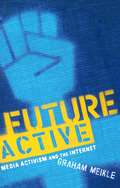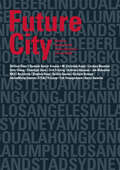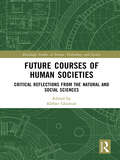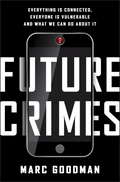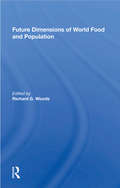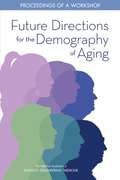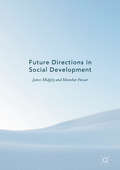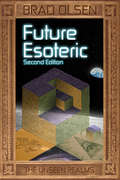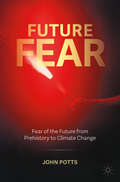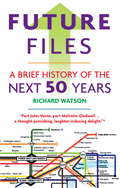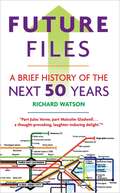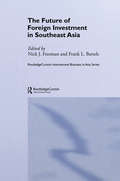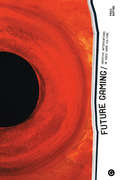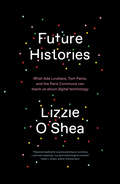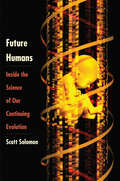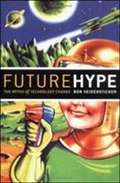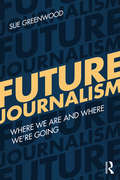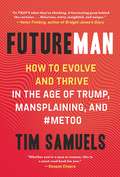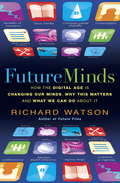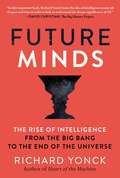- Table View
- List View
Futile Pleasures: Early Modern Literature and the Limits of Utility
by Corey McEleneyHonorable Mention, 2018 MLA Prize for a First BookAgainst the defensive backdrop of countless apologetic justifications for the value of literature and the humanities, Futile Pleasures reframes the current conversation by returning to the literary culture of early modern England, a culture whose defensive posture toward literature rivals and shapes our own.During the Renaissance, poets justified the value of their work on the basis of the notion that the purpose of poetry is to please and instruct, that it must be both delightful and useful. At the same time, many of these writers faced the possibility that the pleasures of literature may be in conflict with the demand to be useful and valuable. Analyzing the rhetoric of pleasure and the pleasure of rhetoric in texts by William Shakespeare, Roger Ascham, Thomas Nashe, Edmund Spenser, and John Milton, McEleney explores the ambivalence these writers display toward literature’s potential for useless, frivolous vanity. Tracing that ambivalence forward to the modern era, this book also shows how contemporary critics have recapitulated Renaissance humanist ideals about aesthetic value. Against a longstanding tradition that defensively advocates for the redemptive utility of literature, Futile Pleasures both theorizes and performs the queer pleasures of futility. Without ever losing sight of the costs of those pleasures, McEleney argues that playing with futility may be one way of moving beyond the impasses that modern humanists, like their early modern counterparts, have always faced.
Future Active: Media Activism and the Internet (Media.culture Ser.)
by Graham MeikleFirst Published in 2003. Routledge is an imprint of Taylor & Francis, an informa company.
Future City
by Stephen Read Job Van Eldijk JürgenThis text focuses on cities as the dominant form of human settlement for the future, examining the transformation that is happening in urban connobations worldwide today. The last few decades have seen a rate of change and growth in cities that has never been seen before, resulting in giant metropoles with over twenty million inhabitants. This book tackles the causes of these changes, and looks at how the planning and design of cities can shape the urban future.
Future Courses of Human Societies: Critical Reflections from the Natural and Social Sciences (Routledge Studies in Science, Technology and Society)
by Kléber GhimireThe future as a field of inquiry, debate or forecasts continues to flourish. However, this book differs from existing literature in several important ways. It is not another publication on future scenarios guided by a linear technological fix - nor is it simply a volume of new statistics on economic, demographic or geopolitical developments. Rather, Future Courses of Human Societies explores and builds a general framework for the long-term evolution of human societies. Drawing upon a wide range of insights from across the social and natural sciences, the authors of this title present original, exploratory methodological and analytical approaches to examining the future. Encouraging the reader to deepen their knowledge and encourage critical thinking, three themes are considered in their complexity and multi-dimensionality: technological innovations; future ‘progress’; and the critical aspect of organizing collective life in the future. Furthermore, in contrast to previous studies which have embraced a relatively short time-span, this text incorporates perspectives from the immediate to the distant future, extending to several centuries and even millennia. An interdisciplinary and internationally comprehensive volume, Future Courses of Human Societies is a key source for students and researchers interested in fields such as future studies, technology in society, interdisciplinary learnings on social and natural sciences and future economic and political evolutions.
Future Crimes
by Marc GoodmanOne of the world's leading authorities on global security, Marc Goodman takes readers deep into the digital underground to expose the alarming ways criminals, corporations, and even countries are using new and emerging technologies against you--and how this makes everyone more vulnerable than ever imagined. Technological advances have benefited our world in immeasurable ways, but there is an ominous flip side: our technology can be turned against us. Hackers can activate baby monitors to spy on families, thieves are analyzing social media posts to plot home invasions, and stalkers are exploiting the GPS on smart phones to track their victims' every move. We all know today's criminals can steal identities, drain online bank accounts, and wipe out computer servers, but that's just the beginning. To date, no computer has been created that could not be hacked--a sobering fact given our radical dependence on these machines for everything from our nation's power grid to air traffic control to financial services. Yet, as ubiquitous as technology seems today, just over the horizon is a tidal wave of scientific progress that will leave our heads spinning. If today's Internet is the size of a golf ball, tomorrow's will be the size of the sun. Welcome to the Internet of Things, a living, breathing, global information grid where every physical object will be online. But with greater connections come greater risks. Implantable medical devices such as pacemakers can be hacked to deliver a lethal jolt of electricity and a car's brakes can be disabled at high speed from miles away. Meanwhile, 3-D printers can produce AK-47s, bioterrorists can download the recipe for Spanish flu, and cartels are using fleets of drones to ferry drugs across borders. With explosive insights based upon a career in law enforcement and counterterrorism, Marc Goodman takes readers on a vivid journey through the darkest recesses of the Internet. Reading like science fiction, but based in science fact, Future Crimes explores how bad actors are primed to hijack the technologies of tomorrow, including robotics, synthetic biology, nanotechnology, virtual reality, and artificial intelligence. These fields hold the power to create a world of unprecedented abundance and prosperity. But the technological bedrock upon which we are building our common future is deeply unstable and, like a house of cards, can come crashing down at any moment. Future Crimes provides a mind-blowing glimpse into the dark side of technological innovation and the unintended consequences of our connected world. Goodman offers a way out with clear steps we must take to survive the progress unfolding before us. Provocative, thrilling, and ultimately empowering, Future Crimes will serve as an urgent call to action that shows how we can take back control over our own devices and harness technology's tremendous power for the betterment of humanity--before it's too late.From the Hardcover edition.
Future Crimes
by Marc GoodmanNEW YORK TIMES and WALL STREET JOURNAL BESTSELLER ONE OF THE WASHINGTON POST'S 10 BEST BOOKS OF 2015One of the world's leading authorities on global security, Marc Goodman takes readers deep into the digital underground to expose the alarming ways criminals, corporations, and even countries are using new and emerging technologies against you--and how this makes everyone more vulnerable than ever imagined. Technological advances have benefited our world in immeasurable ways, but there is an ominous flip side: our technology can be turned against us. Hackers can activate baby monitors to spy on families, thieves are analyzing social media posts to plot home invasions, and stalkers are exploiting the GPS on smart phones to track their victims' every move. We all know today's criminals can steal identities, drain online bank accounts, and wipe out computer servers, but that's just the beginning. To date, no computer has been created that could not be hacked--a sobering fact given our radical dependence on these machines for everything from our nation's power grid to air traffic control to financial services. Yet, as ubiquitous as technology seems today, just over the horizon is a tidal wave of scientific progress that will leave our heads spinning. If today's Internet is the size of a golf ball, tomorrow's will be the size of the sun. Welcome to the Internet of Things, a living, breathing, global information grid where every physical object will be online. But with greater connections come greater risks. Implantable medical devices such as pacemakers can be hacked to deliver a lethal jolt of electricity and a car's brakes can be disabled at high speed from miles away. Meanwhile, 3-D printers can produce AK-47s, bioterrorists can download the recipe for Spanish flu, and cartels are using fleets of drones to ferry drugs across borders. With explosive insights based upon a career in law enforcement and counterterrorism, Marc Goodman takes readers on a vivid journey through the darkest recesses of the Internet. Reading like science fiction, but based in science fact, Future Crimes explores how bad actors are primed to hijack the technologies of tomorrow, including robotics, synthetic biology, nanotechnology, virtual reality, and artificial intelligence. These fields hold the power to create a world of unprecedented abundance and prosperity. But the technological bedrock upon which we are building our common future is deeply unstable and, like a house of cards, can come crashing down at any moment. Future Crimes provides a mind-blowing glimpse into the dark side of technological innovation and the unintended consequences of our connected world. Goodman offers a way out with clear steps we must take to survive the progress unfolding before us. Provocative, thrilling, and ultimately empowering, Future Crimes will serve as an urgent call to action that shows how we can take back control over our own devices and harness technology's tremendous power for the betterment of humanity--before it's too late.From the Hardcover edition.
Future Dimensions Of World Food And Population
by Richard G. WoodsIs it possible to feed those who now are hungry in the world in addition to the billions of people who will be born by the end of the century? Or are we headed for an inevitable Malthusian catastrophe because the task is impossible? What can developing countries do to increase agricultural self-reliance? What population dynamics accompany the transition from high birth and death rates in developing countries to low birth and death rates? What research can aid the struggle to provide food to the world's masses? These and other questions are explored by an array of experts who participated in the Congressional Roundtable on World Food and Population during 1979-80. They offer this collection of papers in the spirit of optimism about the future and about the U.S. role in international development.
Future Directions for the Demography of Aging: Proceedings Of A Workshop
by Engineering Medicine National Academies of SciencesAlmost 25 years have passed since the Demography of Aging (1994) was published by the National Research Council. Future Directions for the Demography of Aging is, in many ways, the successor to that original volume. The Division of Behavioral and Social Research at the National Institute on Aging (NIA) asked the National Academies of Sciences, Engineering, and Medicine to produce an authoritative guide to new directions in demography of aging. The papers published in this report were originally presented and discussed at a public workshop held in Washington, D.C., August 17-18, 2017. The workshop discussion made evident that major new advances had been made in the last two decades, but also that new trends and research directions have emerged that call for innovative conceptual, design, and measurement approaches. The report reviews these recent trends and also discusses future directions for research on a range of topics that are central to current research in the demography of aging. Looking back over the past two decades of demography of aging research shows remarkable advances in our understanding of the health and well-being of the older population. Equally exciting is that this report sets the stage for the next two decades of innovative research–a period of rapid growth in the older American population.
Future Directions in Social Development
by James Midgley Manohar PawarThis book invites readers to think about future directions in social development. The book succinctly presents the historical context and progress of social development. By reflecting on the Millennium and Sustainable Development Goals, it discusses the increasing global relevance of several critical themes and issues such as human rights and good governance, participation, peace, gender, environment, religion and spirituality, aging, social protection and partnership. It appreciates the importance of goals and targets, but calls to look beyond them to visualise future directions in social development. The book argues that values-driven social development needs to focus on knowledge creation, dissemination and training, draw on multidisciplinary knowledge and professionals, promote conscientious consumption, create less unequal societies and engage in innovation that brings happiness to everyone.
Future Esoteric: The Unseen Realms
by Brad OlsenExamining the flaws of mainstream society, this collection of conspiracy theory, esoteric knowledge, and fringe subjects seeks to present solutions to current social, economic, and environmental world issues. This book encourages the exploration and integration of modern science with ancient wisdom, which will lead modern society towards advancement and enlightenment. Topics discussed include religious mythos, government manipulation, technological advances, and utopia.
Future Fear: Fear of the Future from Prehistory to Climate Change
by John PottsThis book places the contemporary fear of climate change in historical perspective, showing that throughout human history the dominant perspective on the future has been one of fear. Across a broad historical sweep, the book describes the varied means employed to predict and control the future: magic, religion, science, and technology. Future Fear traces fear of the future from prehistory to the present, culminating in the contemporary fear of imminent climate change catastrophe. Consideration is also given to hope in a more positive future, revealing that visions of the future have often been a mingling of fear and hope.
Future Files
by Richard WatsonFuture Files is filled with provocative forecasts about how the world might change in the next half century. It examines emerging trends and developments in society, technology, economy, and business, and makes educated speculations as to where they might take us.
Future Files: A Brief History of the Next 50 Years
by Richard WatsonWlliam Gladwell meets Alvin Toffler in this lively, provocative and witty look at our possible futures. Filled with provocative forecasts about how the world might change in the next half century, Future Files examines emerging patterns and developments in society, technology, economy, and business, and makes educated speculations as to where they might take us. It is indispensable to business analysts, strategists and organisations who need to stay ahead of the game as well as providing rich and fascinating material for dinner party conversations. Will machines become more intelligent than humans, and even be able to 'read' our minds? Will food in our fridge speak to each other using radio waves, then come up with options for tonight's menu? Is there a looming environmental crisis where Planet Earth is doomed? Would you like a pill that improves your memory? ...Or a moistened tissue that could erase a bad day? Would you feel safer if your front door could tell you whether the person knocking is not a stranger? These are just some of the provocative forecasts about how the world might change in the next half century which Richard Watson explores in "Future Files".
Future Files: A Brief History of the Next 50 Years
by Richard WatsonWlliam Gladwell meets Alvin Toffler in this lively, provocative and witty look at our possible futures. Filled with provocative forecasts about how the world might change in the next half century, Future Files examines emerging patterns and developments in society, technology, economy, and business, and makes educated speculations as to where they might take us. It is indispensable to business analysts, strategists and organisations who need to stay ahead of the game as well as providing rich and fascinating material for dinner party conversations. Will machines become more intelligent than humans, and even be able to 'read' our minds? Will food in our fridge speak to each other using radio waves, then come up with options for tonight's menu? Is there a looming environmental crisis where Planet Earth is doomed? Would you like a pill that improves your memory? ...Or a moistened tissue that could erase a bad day? Would you feel safer if your front door could tell you whether the person knocking is not a stranger? These are just some of the provocative forecasts about how the world might change in the next half century which Richard Watson explores in "Future Files".
Future Foreign Investment SEA
by Nick J. Freeman Frank L. BartelsThis book explains the dynamics behind Southeast Asia's foreign investment activity, and looks at the region's options for reviving its reputation as an attractive host for foreign investors. Each chapter focuses on a key element; together, they portray southeast Asia's foreign investment profile and prospects. By bringing these key interlocking elements together under a single cover, the book aims to provide a more profound understanding of the challenges southeast Asian countries face in their on-going attempts both to attract new foreign investment inflows and to continue hosting substantial existing foreign-invested assets.
Future Gaming: Creative Interventions in Video Game Culture (Goldsmiths Press / Future Media Series)
by Paolo RuffinoA sophisticated critical take on contemporary game culture that reconsiders the boundaries between gamers and games.This book is not about the future of video games. It is not an attempt to predict the moods of the market, the changing profile of gamers, the benevolence or malevolence of the medium. This book is about those predictions. It is about the ways in which the past, present, and future notions of games are narrated and negotiated by a small group of producers, journalists, and gamers, and about how invested these narrators are in telling the story of tomorrow.This new title from Goldsmiths Press by Paolo Ruffino suggests the story could be told another way. Considering game culture, from the gamification of self-improvement to GamerGate's sexism and violence, Ruffino lays out an alternative, creative mode of thinking about the medium: a sophisticated critical take that blurs the distinctions among studying, playing, making, and living with video games. Offering a series of stories that provide alternative narratives of digital gaming, Ruffino aims to encourage all of us who study and play (with) games to raise ethical questions, both about our own role in shaping the objects of research, and about our involvement in the discourses we produce as gamers and scholars. For researchers and students seeking a fresh approach to game studies, and for anyone with an interest in breaking open the current locked-box discourse, Future Gaming offers a radical lens with which to view the future.
Future Girl: Young Women in the Twenty-First Century
by Anita HarrisAnita Harris creates a realistic portrait of the "new girl" that has appeared in the twenty-first century--she may still play with Barbie, but she is also likely to play soccer or basketball, be assertive and may even be sexually aware, if not active. Building on this new definition, Harris explores the many key areas central to the lives of girls from a global perspective, such as girlspace, schools, work, aggression, sexuality and power.
Future Histories: What Ada Lovelace, Tom Paine, and the Paris Commune Can Teach Us About Digital Technology
by Lizzie O'SheaA highly engaging tour through progressive history in the service of emancipating our digital tomorrow.When we talk about technology we always talk about tomorrow and the future -- which makes it hard to figure out how to even get there. In Future Histories, public interest lawyer and digital specialist Lizzie O'Shea argues that we need to stop looking forward and start looking backwards. Weaving together histories of computing and progressive social movements with modern theories of the mind, society, and self, O'Shea constructs a "usable past" that can help us determine our digital future.What, she asks, can the Paris Commune tell us about earlier experiments in sharing resources--like the Internet--in common? How can Frantz Fanon's theories of anti colonial self-determination help us build digital world in which everyone can participate equally? Can debates over equal digital access be helped by American revolutionary Tom Paine's theories of democratic, economic redistribution? What can indigenous land struggles teach us about stewarding our digital climate? And, how is Elon Musk not a future visionary but a steampunk throwback to Victorian-era technological utopians?In engaging, sparkling prose, O'Shea shows us how very human our understanding of technology is, and how when we draw on the resources of the past, we can see the potential for struggle, for liberation, for art and poetry in our technological present. Future Histories is for all of us--makers, coders, hacktivists, Facebook-users, self-styled Luddites--who find ourselves in a brave new world.
Future Humans: Inside the Science of Our Continuing Evolution
by Scott SolomonAn evolutionary biologist provides surprising insights into the changing nature of Homo sapiens in this &“important and an entertaining read" (Choice). In Future Humans, evolutionary biologist Scott Solomon draws on recent discoveries to examine the future evolution of our species. Combining knowledge of our past with current trends, Solomon offers convincing evidence that evolutionary forces are still affecting us today. But how will modernization—including longer lifespans, changing diets, global travel, and widespread use of medicine and contraceptives—affect our evolutionary future? Solomon presents an entertaining and accessible review of the latest research on human evolution in modern times, drawing on fields from genomics to medicine and the study of our microbiome. Drawing together topics ranging from the rise of online dating and Cesarean sections to the spread of diseases such as HIV and Ebola, Solomon suggests that we are entering a new phase in human evolutionary history—one that makes the future less predictable and more interesting than ever before.
Future Hype: The Myths of Technology Change
by Bob SeidenstickerConventional wisdom says that technology is the greatest new growth frontier, coupling infinite potential with an ever-growing number of faster, more efficient, and more reliable products and instruments.According to this view, we live in an unprecedented golden age of technological expansion. Not so, according to Future Hype.
Future Journalism: Where We Are and Where We’re Going
by Sue GreenwoodFuture Journalism investigates where journalism has come from, where it is now and where it might be going, through a range of case studies on organisations pushing the traditional boundaries of journalism, including Vice, Buzzfeed, Bellingcat, The Washington Post, the Guardian, Circa and Narrative Science. Sue Greenwood presents an analysis of the significant trends and practices shaping contemporary journalism and investigates what they can tell us about possible new directions for the news industry in the future. Chapters explore: the rise of new business models for digital news production and their future; debates around the potential for non-human "journalists"; the fluctuating figures around news consumption by audiences and what they can mean; the growing importance of ethical journalism in the digital age; practical exercises and recommended further reading. In a constantly evolving media environment, this book guides readers through some of the most vital contemporary debates and important technological developments. It is essential reading for students and young professionals preparing for a future in the journalism industry.
Future Man: How to Evolve and Thrive in the Age of Trump, Mansplaining, and #MeToo
by Tim SamuelsA sharply intelligent, explosively honest, and laugh-out-loud funny look at the state of masculinity and how to be a man, for fans of Jon Ronson and Matt Haig.If ever there was an urgent need for a frank understanding of what's going on with men, it is now. Male rage and frustration have driven resurgent populism, mass shootings, and epidemics of addiction and violence. Powerful men who have abused their positions for decades have been and are being #MeToo–outed and dismissed. The patriarchy, that solid bedrock of male power for thousands of years, seems to be crumbling.In Future Man, with his characteristic intelligence and humor, Tim Samuels assesses the state of contemporary manhood, its conflicts, confusions, and challenges. Trapped in bodies barely changed since cavemen days, men are contending with the stresses of corporate culture, lifelong commitment, rampant depression, and crazy expectations to be successful at work and at home. But how can you hunt and gather in an open-plan office? Why do men make up to 95 percent of Fortune 500 CEOs yet 93 percent of the prison population? Why do men commit suicide at more than three times the rate of women?Drawing on his own experience and reporting, Samuels addresses such topics as dating, aging, fatherhood, porn, violence, mental health, and the trouble with monogamy as well as issues related to toxic masculinity, the man box, gender roles, and role models. The American edition has been updated and includes a new preface.
Future Minds
by Richard WatsonDrawing on the latest research, this book looks at the ways that screen culture is shaping the future and changing the way we think. Future Minds asks: are we becoming addicted to data and how do we go about starting a digital diet, urgently? You'll find thought-provoking and practical suggestions about reclaiming the space and time to think deeply.
Future Minds: How the Digital Age Is Changing Our Minds, Why This Matters, and What We Can Do About It
by Richard WatsonDrawing on the latest research, this book looks at the ways that screen culture is shaping the future and changing the way we think. Future Minds asks: are we becoming addicted to data and how do we go about starting a digital diet, urgently? You'll find thought-provoking and practical suggestions about reclaiming the space and time to think deeply.
Future Minds: The Rise of Intelligence from the Big Bang to the End of the Universe
by Richard YonckFor Readers of Michio Kaku and Stephen Hawking, an Epic Journey through the Intelligent Universe With the ongoing advancement of AI and other technologies, our world is becoming increasingly intelligent. From chatbots to innovations in brain-computer interfaces to the possibility of superintelligences leading to the Singularity later this century, our reality is being transformed before our eyes. This is commonly seen as the natural result of progress, but what if there&’s more to it than that? What if intelligence is an inevitability, an underlying property of the universe? In Future Minds, Richard Yonck challenges our assumptions about intelligence—what it is, how it came to exist, its place in the development of life on Earth and possibly throughout the cosmos. Taking a Big History perspective—over the 14 billion years from the Big Bang to the present and beyond—he draws on recent developments in physics and complexity theory to explore the questions: Why do pockets of increased complexity develop, giving rise to life, intelligence, and civilization? How will it grow and change throughout this century, transforming both technology and humanity? As we expand outward from our planet, will we discover other forms of intelligence, or will we conclude we are destined to go it alone? Any way we look at it, the nature of intelligence in the universe is becoming a central concern for humanity. Ours. Theirs. And everything in between.

